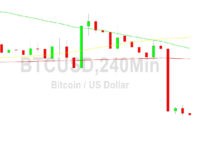What’s Happening With Wrapped Bitcoin on Ethereum?

An important “wrapped” token nearly unraveled last week—the latest crypto product to be hurt by the fallout of the once-dominant FTX exchange which collapsed earlier this month.
For those who don’t know, Wrapped Bitcoin (WBTC) is the 23rd largest cryptocurrency, with a market cap of $3.5 billion. It runs on Ethereum, the leading blockchain for DeFi and NFTs, and is a token that is meant to represent Bitcoin.
The idea—mostly—with WBTC is that traders who want to use their Bitcoin holdings in the Ethereum ecosystem can do so with tokens that are one-to-one backed by Bitcoin. It’s how Bitcoin holders can interact with DeFi tools without spending more money on Ethereum or other Ethereum-based tokens.
It’s an important tool in the world of DeFi—financial products that allow their users to borrow, lend, or trade digital assets without third-party intermediaries. In the past 24 hours, over $88 million-worth of WBTC tokens traded hands, according to CoinGecko.
But last week the token depegged, losing its one-to-one value to Bitcoin, blockchain-data firm Kaiko said. Since FTX blew up at the start of November, WBTC has traded on exchanges at a discount to Bitcoin, it reported—something which isn’t supposed to happen if the token is pegged one-to-one by the largest cryptocurrency.
What is Bitcoin DeFi, and How Does It Work?
“The largest wrapped version of bitcoin on the Ethereum network, WBTC, has traded at a persistent discount to BTC since mid-November, dipping to -1.5% on Friday,” the firm wrote in a Monday blog post.
“While one WBTC should always be redeemable for one BTC through official merchants, the token also trades on open markets, which means its price relative to BTC can fluctuate.”
The firm added that charts shared on Twitter that claimed bankrupt trading firm Alameda Research was the top WBTC merchant spooked investors who thought the token may not actually be backed by Bitcoin reserves. This isn’t true, Kaiko said, adding that the reserves can be “confirmed on-chain.”
$WBTC is trading at a .5% discount to BTC.
In our latest Data Debrief, we explore:
— concern over wrapped assets
— $stETH discount
— the $CRV manipulation attempt
— derivatives activityand much more! ⬇️https://t.co/xZDmhHsQGX
— Kaiko (@KaikoData) November 28, 2022
Alameda Research was set up by ex-FTX CEO Sam Bankman-Fried. It fell with FTX after it became apparent client money from the exchange was being used by the trading firm—something ultimately unsustainable.
Crypto custody firm BitGo is the main custodian of WBTC. Its COO Chen Fang said on Twitter that rumors WBTC wasn’t backed one-to-one by Bitcoin was “fake news.” BitGo did not respond to Decrypt’s request for a comment.
Kieran Mesquita, a developer behind the DeFi privacy project Railgun, told Decrypt that for now, the depegging isn’t something to worry about.
“WBTC hasn’t depegged significantly (~2% at its peak, which was quickly restored), until that happens it will still continue to function as a way to bring BTC into DeFi on Ethereum,” he said.
For now, WBTC is back pegged with Bitcoin—something investors in the DeFi space are “no doubt relieved” about, according to Kaiko.
But Mesquita added that WBTC losing its peg could bring more decentralization into the space, considering that the asset’s primary custodian is BitGo, a centralized firm. “Longer term, if WBTC doesn’t regain confidence then it will likely be replaced by a more decentralized alternative,” he said.






 Bitcoin
Bitcoin  Ethereum
Ethereum  Tether
Tether  USDC
USDC  TRON
TRON  Dogecoin
Dogecoin  Cardano
Cardano  Bitcoin Cash
Bitcoin Cash  Chainlink
Chainlink  Monero
Monero  LEO Token
LEO Token  Zcash
Zcash  Stellar
Stellar  Litecoin
Litecoin  Hedera
Hedera  Dai
Dai  Cronos
Cronos  OKB
OKB  Tether Gold
Tether Gold  Ethereum Classic
Ethereum Classic  KuCoin
KuCoin  Algorand
Algorand  Gate
Gate  Cosmos Hub
Cosmos Hub  VeChain
VeChain  Stacks
Stacks  Tezos
Tezos  Dash
Dash  TrueUSD
TrueUSD  IOTA
IOTA  Basic Attention
Basic Attention  Theta Network
Theta Network  Decred
Decred  NEO
NEO  Synthetix
Synthetix  Qtum
Qtum  Ravencoin
Ravencoin  0x Protocol
0x Protocol  DigiByte
DigiByte  Zilliqa
Zilliqa  Holo
Holo  Nano
Nano  Siacoin
Siacoin  Numeraire
Numeraire  Waves
Waves  Status
Status  Enjin Coin
Enjin Coin  Ontology
Ontology  Hive
Hive  BUSD
BUSD  Lisk
Lisk  Pax Dollar
Pax Dollar  Steem
Steem  Huobi
Huobi  NEM
NEM  OMG Network
OMG Network  Bitcoin Gold
Bitcoin Gold  Augur
Augur